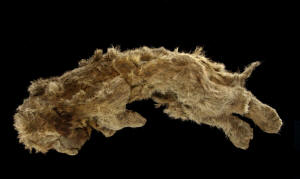|
The
female cub, named Sparta, was found at the Semyuelyakh River in
Russia's Yakutia region in 2018 and a second lion cub called
Boris was found the year before, according to a study published
in the Quaternary journal.
The cubs were found 15 metres apart but are not only from
different litters but were also born thousands of years apart.
Boris, a male cub, lived around 43,448 years ago, the study
said.
The two cubs aged 1-2 months were found by mammoth tusk
collectors. Two other lion cubs named Uyan and Dina have also
been found in the region in recent years.
Cave lions have been extinct for thousands of years.
Valery Plotnikov, one of the study's authors, told Reuters in
the regional capital Yakutsk that Sparta was so well preserved
that it still had its fur, internal organs and skeleton.
"The find itself is unique; there was no any other such find in
Yakutia," he said.
"Maybe, we hope, some disintegrated parts of the mother's milk
(remain intact). Because if we have that, we can understand what
its mother's diet was," he said.
Similar finds in Russia's vast Siberian region have happened
with increasing regularity. Climate change is warming the Arctic
at a faster pace than the rest of the world and has thawed the
ground in some areas long locked in permafrost.
(Reporting by Roman Kutukov; writing by Tom Balmforth; editing
by Angus MacSwan)
[© 2021 Thomson Reuters. All rights
reserved.] Copyright 2021 Reuters. All rights reserved. This material may not be published,
broadcast, rewritten or redistributed.
Thompson Reuters is solely responsible for this content.

|
|




